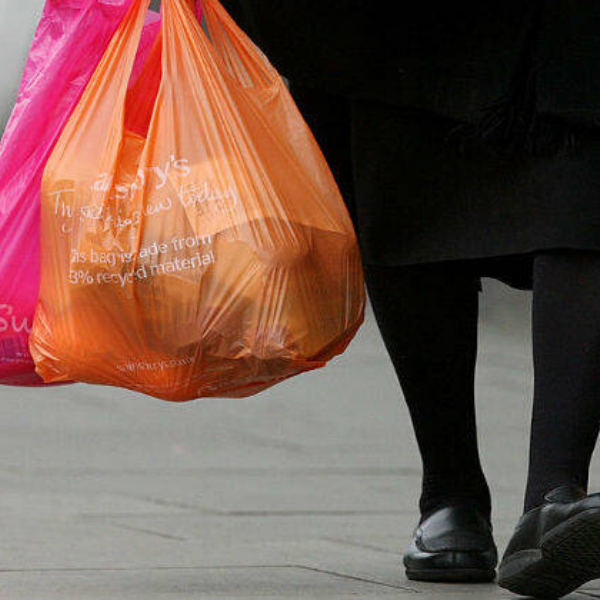If you like me are always interested in finding the truth behind internet memes and always want to fact check the information you read on your favourite Facebook groups, you have just come to the right blog post.
I have seen this topic discussed multiple times on social media and blog post: are plastic bags more sustainable than cotton ones? Or paper one? There are many studies being shared to support one opinion over the other, and it really got me curious because I really wanted to find out the truth behind all these claims.
So the question is: Are canvas tote bags better than plastic bags? What about paper bags?
When I started researching the topic in-depth, I came across 2 problems pretty much straight away. The first one is that most articles available on the subject merely look at the carbon footprint of producing these different carrier bags, but they won’t take into consideration the length of use and the disposable implications of the types of bags analysed. The second troubling aspect was that “plastic” bags and “cotton” bags were all lumped into a very generic, unique category each.
We know that plastics are not all the same, there are many different types and some are not as damaging as others (even though we still believe no matter what label, plastic is a problematic material when mass-produced as it’s very hard to make sure it is used and discarded in a proper way)
So let’s have a look at the different types of bags before we start comparing their sustainability.
PLASTIC BAGS, ARE THEY EC0-FRIENDLY AT ALL?

Shopping bags are a very widespread element of people’s everyday lives all across the globe. They come in many shapes and forms, as well as materials such as high-density polyethene (HDPE), low-density polyethene (LDPE), degradable plastic, among others.
The ones we are most used to, the so-called supermarket plastic bags, are made of from high-density polyethene (HDPE).
You may have read that there have been multiple studies, including one commissioned by the U.K. Government Environment Agency Study Reportin 2011 and a Scottish Report from 2005 among others, and they all reach the same conclusion: HDPE bags have a low carbon footprint. But what does that mean?
It means that manufacturing plastic bags is less resource-intensive than paper bags or cotton tote shopper bags. They are also are by far the least costly. Also, when reused, their carbon footprint is lowered even more. So you may say, all I have heard about plastic bags being bad for the environment was all a lie, and we should actually use them more?
Not so fast. These studies only concentrate on the aspect of carbon footprint: this is due to various factors for which plastic bags scored very low in all the testing, specifically:
- water consumption: use of water for the production of the bags
- atmospheric acidification: which can have effects on human health, sensitive ecosystems, forest decline and acidification of lakes
- eutrophication* of water bodies: which can lead to the growth of algae and depletion of oxygen
However, in order for the average carbon footprint levels to be truly inferior AFTER PRODUCTION, we need to look at how many times bags can be reused. And this is when things get complicated because It really depends on how many times people decide to use them again, and, how carefully they manage to dispose of them once their useful life is over.
Regarding reusing plastic bags, one of the tricky things is that even if they have the potential to be utilised multiple times, most people either end up collecting them in a kitchen drawer that never gets opened. Alternatively, they are commonly used as bin liners. Although we are all for repurposing, the problem with this is that not only the plastic bag goes straight to the landfill, but in case people may want to save it, food waste contamination or laceration due to sharp objects may prevent it from being recycled.
So even though plastic bags have a lower carbon footprint up until they are produced, that quickly changes when we take into account their reusability and disposal.
There are also other bags, made from non-woven polypropylene, which have a slightly different impact on the environment.

Woven polypropylene is a plastic polymer that can be melted down and recycled in order to manufacture other products. This material is most commonly seen in promotional tote bags and shopper bags.
These bags only need to be reused around 10-11 times to break even with the conventional plastic environmental impact. However, if they are produced on the other side of the world, shipped by air and by suppliers who do not adhere to environmental standards of waste disposal, then their sustainability score is really quite low compared to reusable options.
Reusable cotton bags: are they really sustainable?

You may have heard a lot of contradicting things about cotton bags. Some people love them, some people hate them. Some think they are the best eco-friendly option available when it comes to carrier bags, and some people will just scare the hell out of you with their steep carbon footprint figures.
So what’s the truth? Again, as with the studies we mentioned before, it seems to us that each of these investigations only takes into account a limited number of factors and segments along the production chain, while we want to consider the whole manufacturing as well as the useful life of these bags.
Personally here at EarthBits.com we are big fans of cotton bags. I actually switched from plastic bags to all sorts of reusable cotton bags years ago. It is such a simple action, yet so powerful. Imagine every time you buy your grocery from the market or your supermarket, you stop using plastic bags for your vegetables and put them into reusable tote bags instead: the plastic waste you can save in a year is extraordinary. What if more and more people switched to this simple habit too?
The reduction in single-use plastic is enormous, and it’s such an easy change to do, as these simple cotton produce bags can be easily carried around in your handbag, backpack or even in the side pocket of your gym bag all the time, as they take literally no space at all, and you can always be sure to have them handy any time you need to nip into a shop.
So why are some people so against them? The issue with cotton is that it is typically grown on semiarid land so it consumes a huge amount of water and you also need a lot of pesticides. This obviously can be solved by making sure that the cotton we use is GOTS and organic, so no chemical pesticides have been used. Another essential element again is what comes after the production-cycle. Although it’s true that plastic bag produces less greenhouse gas, they use less water and they use far fewer chemicals compared to cotton ones, it is also true that if used for a long time cotton absorbs and even cancels its initial carbon impact.
This can only happen if any single cotton bag is used approximately 131 times. It seems quite a lot compared to single-use when it comes to plastic bags, but is it really so?
I have used my cotton tote bag since I was in university, which means I have been using it for the past 15 years! And even though some of the print has faded away, it is still going strong! So trying to compare my bag’s carbon footprint compared to a single-use plastic bag that was used once for shopping and secondly as a dog poop bag is ingenious at the least and preposterous at the most!
Just a few more facts that are important to keep In mind when it comes to cotton bags:
- An average cotton shopping bag would need to be reused 131 times to account for its higher impact on the production side. If you are planning on using it for years, rather than weeks or months, that’s going to make up for the production impact
- Choose suppliers who make organic products, free from pesticides, as this makes a big difference in terms of water pollution, not just water consumption.
- A good habit is not to wash your cotton bags every time you use them. If you need to refresh them, you can hang them outside on a drying line, also make sure when you do wash them that you use mild natural washing soap and at 30 degrees Celcius to avoid damaging the fabric and preventing it from fraying. This will also increase its durability and use life!
What about paper bags?

Paper bags are quite controversial: according to this UK study, a paper bag needs to be reused at least 4 times to absorb its environmental footprint. This does not only include carbon emissions, but also water consumption needed for manufacturing, and the use of fertilisers for raw material growth. In the case of paper, a bag needs 4 times more water than a plastic carrier. Other issues are chemicals used for tree farming, as these can have an effect on creating acid rains and pollution of water.
Although not as resistant as plastic or cotton, the positive thing about it is that it is easily compostable, so it can be added to pretty much any back garden compost bin turning into useful fertilizer. Paper is also widely recycled, which is definitely a score in favour.
SO WHAT’S MORE SUSTAINABLE: PAPER, PLASTIC OR COTTON BAGS?
The answer is: it depends on the manufacturing source and how long they are used for! In general, reusable options are the best ones, as once used for a specific amount of time, they neutralise their burden on the environment.
What matters is our individual actions: stirring away from single-use bags, buying organic and fair trade, and most of all reusing everything we buy is the true secret to make a bag really sustainable.
Durability is also an essential element to consider: how resistant is the bag you have chosen? How many times can it be used without breaking or tearing?
Lastly, being able to be composted at the end of (a long) life without creating extra pollution, is definitely going to add to the sustainability score of your bag of choice.
We at EarthBits think that organic, GOTS cotton bags made by ethical companies are the true winners, what do you think?








Leave a comment (all fields required)